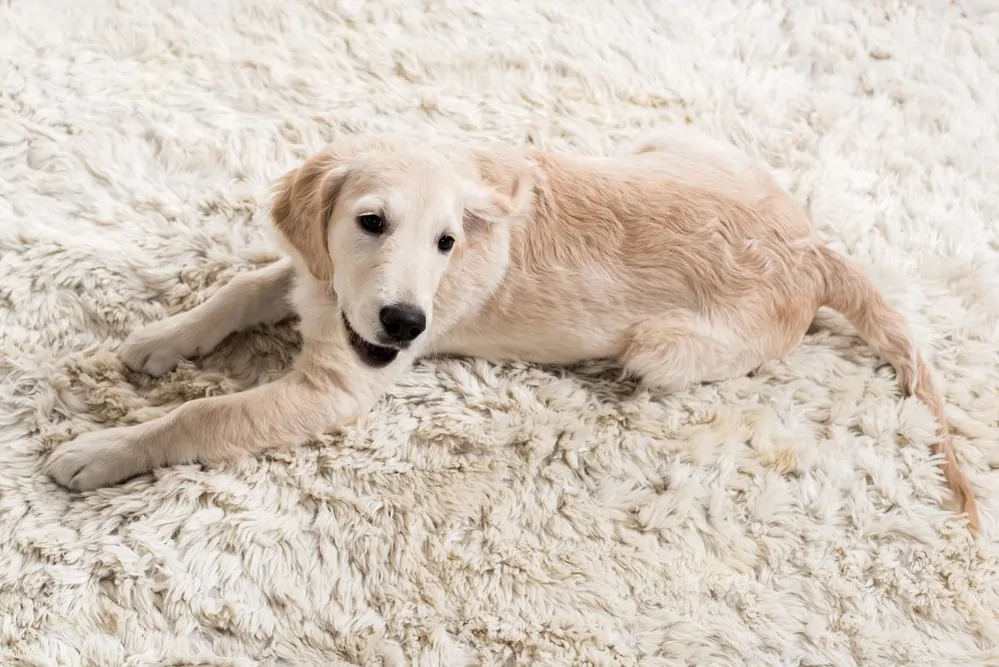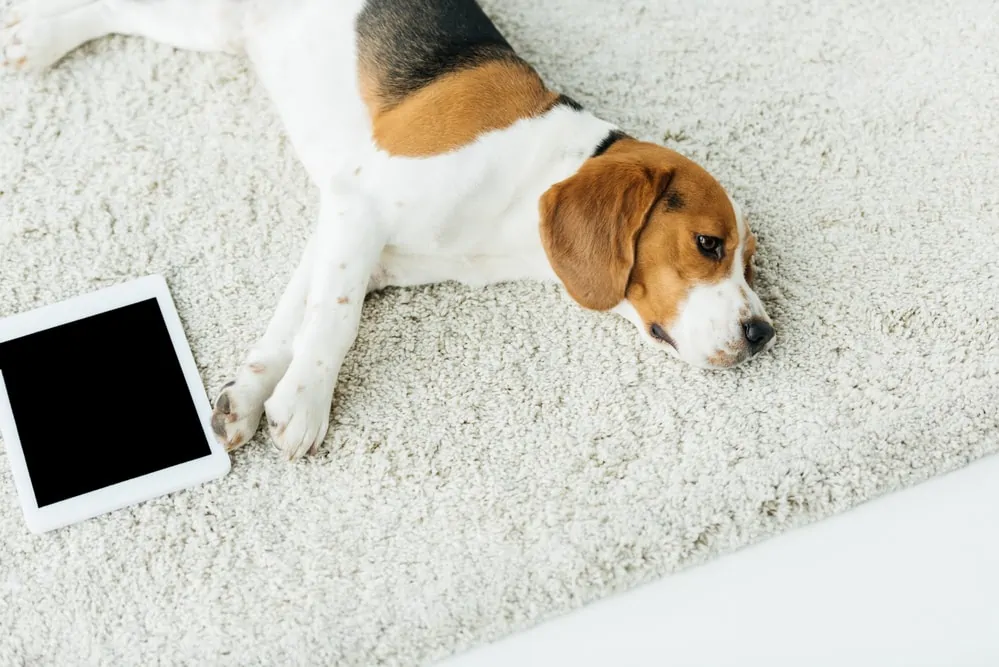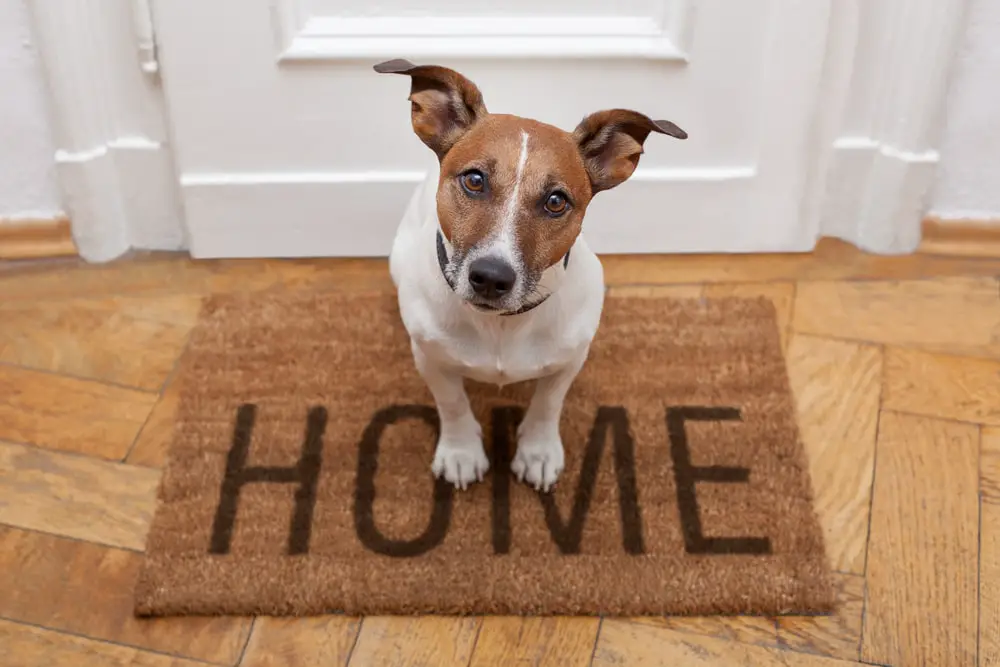All dog owners have had the experience of their furry friend chewing up something they shouldn’t have, such as shoes, children’s toys, or even spoiled meat from the trash. With puppies, chewing can be a way to relieve boredom, soothe the pain of teething, or to just explore the new world they’re a part of.
But as dogs grow older, they usually outgrow this behavior, which can make it particularly distressing if you find that your dog has eaten carpet.
What do you do when your dog eats the carpet?
If your dog has eaten carpet, the first thing to do is to try to determine how much they’ve eaten and contacted your vet, as they can assess the damage and determine if inducing vomiting is necessary or if the dog may need help passing the carpet.
Be sure to watch for any symptoms such as vomiting, diarrhea, lethargy, or a refusal to eat.
While your dog may simply vomit the carpet back up, or pass it in its stool over the next day or two, intestinal blockage and infection are major concerns that need to be addressed.
Why Do Dogs Eat Carpet?

Depending on the age and temperament of the dog, there could be a variety of reasons for eating strange objects such as carpet.
In order to prevent future occurrences, it’s important to figure out the root cause of the behavior.
Why Do Puppies Eat Carpet?
Puppies need plenty of exercise, stimulation, and interaction with their new owners. Curious puppies explore their new world through chewing, and if they are not given an outlet for that behavior, they may begin to tear up and eat carpet. Your puppy may be bored, lonely, full of excess energy, or just curious.
Much like babies, puppies experience pain and irritation when their teeth grow in.
Their “baby teeth” usually start growing in about a month after birth, and tend to fall out between the first and second year. During this period, dogs often will soothe the pain of their gums by chewing on carpet or something else that has some texture, and can also chew carpet to assist their baby teeth in fully falling out.
Chewing will help relieve the pain, and you may begin to find patches of carpet torn up where your puppy has eaten it (Cerulli, 2018).
So what to do? Simply provide chew toys that are helpful for the teething process and that will help soothe their aching gums. Check out Amazon’s puppy chew toy section for a wide array of great toys that are helpful to this process. And finally, if your puppy is simply overactive and teething isn’t a specific issue – try exercising your dog more, take him/her out for more walks, the park, etc.
Boredom
Dogs of all ages need play that burns off excess energy and stimulates their minds.
This is especially true for high-energy breeds like terriers and collies.
When a dog gets bored, it will look for something to do to occupy its time.
Unfortunately, this often leads to chewing and destructive behavior.
Socks, children’s toys, furniture, and carpet are all common things a bored dog will chew.
Stress
Stress can be a major contributor to carpet eating in dogs.
Many dogs suffer from separation anxiety and will engage in destructive behavior when left alone.
Loud noises, such as thunderstorms or fireworks, can also cause stress-related carpet eating.
If you have multiple pets, watch their interactions.
Dogs often attempt to assert their dominance over other dogs, and this can come in the form of fighting, nipping at one another, stealing food, or a variety of other behaviors.
If your dog is being “bullied” by another dog, this can be an understandably stressful environment to live in, which can lead to carpet eating.
Malnutrition and Illness
While many people enjoy sharing table scraps with their dogs, it’s important to make sure your dog is getting a proper diet of food that is beneficial to it.
If your dog is not getting its nutritional needs met, they can develop a condition known as pica.
Pica can cause your dog to eat all manner of non-food items.
Eating rocks is a common sign of pica, but eating carpet can also be a symptom.
Dogs also eat foreign matter when they feel sick and need to make themselves vomit.
If a dog is outside when this occurs, you’ll likely see them eating grass in order to force themselves to regurgitate.
Inside dogs, however, may eat house plants or carpet for this reason.
What to do When Your Dog has Eaten Carpet

Okay, so you’ve discovered your dog has eaten carpet. Now what? The first thing to do is to determine how much.
If it is only a small amount, observing your dog and waiting for it to pass may be all that’s necessary.
Your dog may also vomit the carpet back up after some time has passed.
Call your vet first just to make sure.
Even if vomiting does occur, it’s important to monitor your dog over the next few days and contact the vet if you see any changes in appetite, energy level, or bathroom habits.
If it has eaten a large amount, taking them to the vet is advised.
The biggest concerns are blockage and infection.
The vet may want to do a physical exam, and possibly an x-ray, to determine if the carpet can be passed or if inducing vomiting will do the trick.
In extreme cases, surgery may be necessary.
Carpet has some specific dangers that other foreign items may not.
For one, the carpet fibers can become wrapped around the intestines, pinching off areas or creating a blockage.
Carpet is also full of bacteria, which can lead to infection.
Observe your dog for signs of infection, such as fever, lethargy, and lack of appetite, and notify your vet if they occur (source).
One of the most important things to do when your dog has eaten carpet is to provide lots of love and comfort.
Letting your dog know you’re there for them with extra attention, love, petting, and hugs will help them feel better once the worst parts are over.
How to Prevent Your Dog from Eating Carpet

In most cases, the easiest way to prevent destructive behavior such as carpet eating is to provide your dog with plenty of exercise and toys to chew on.
This is especially the case with puppies.
Taking your dog for walks and playing fetch are great ways to get rid of excess energy and cure boredom.
If you’re dealing with a puppy, be sure to provide plenty of toys, and play with them with these toys so they learn what they should and should not be chewing on.
Rawhide and similar edible products can provide satisfaction for their chewing tendencies, but dogs should be monitored closely while consuming these products, as they can be a choking hazard once they get small enough to swallow.
If your puppy is teething, freeze a wet washcloth and then give it to your dog to chew.
The cold will help soothe its sore gums.
However, be sure to supervise them and take the cloth away if they start to tear it up and swallow the fabric, or you’ll be in a similar situation as if they’d eaten carpet (source).
Learn how to stop destructive chewing in this short video below:
Dealing with Stress and Illness
If your dog eats carpet when stressed, consider ways to reduce the stress.
Providing your dog with a comfortable crate and training it to feel safe and secure inside is one-way many dog owners deal with dogs who are prone to destructive behavior when stressed out.
Crate training can provide a dog who suffers from anxiety a safe place to rest during stressful situations with the added benefit of keeping them away from the carpet.
If your dog suffers from separation anxiety, there are steps you can go through to help.
Avoid making a big show of leaving or arriving.
Leaving older clothes that smell like you with the dog when you go can help them feel less lonely.
This can be especially effective combined with crate training.
In extreme cases of separation anxiety, crate training may not help, as the dog will simply continue to exhibit destructive behaviors inside the crate (source).
In some extreme cases, medication may be necessary to alleviate stress.
Talk with your vet to determine which medication and dosage might be right for your dog.
It may take some trial and error to find a dosage that comforts your dog while still allowing them to function normally.
If an illness is the suspected culprit, a trip to the vet may be necessary.
If you think your dog is eating carpet in order to regurgitate, taking them outside where they have access to grass would offer a safer alternative.
If pica is suspected, talk with your vet about the food options available to ensure you’re giving your dog the food it needs.
Final Thoughts
All dogs go through phases of chewing and eating things they shouldn’t.
With puppies, this behavior is normal, if frustrating, and they should outgrow it with time and proper training.
When it comes to older dogs, though, taking the steps to keep your dog from eating carpet can save you a lot of stress and money, not to mention discomfort for your furry friend.
If your dog has eaten carpet, however, don’t panic.
By determining how much carpet your dog ate, monitoring their behavior, and taking them to see the vet, you can help your dog feel better soon with minimal lasting effects.


0 Comments